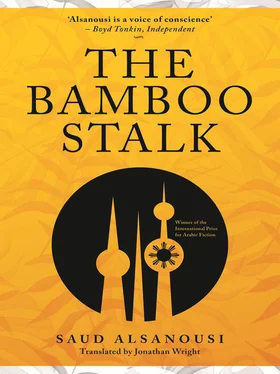Ghassan stroked my head as if I were a pet dog.
15
‘Isa, Isa, Isa.’
The calls came almost every day. They came from the window of Grandmother’s room on the upper floor, then crossed the courtyard and filtered into my room. Grandmother had become more accepting of me than at first. The change apparently began from below, from her feet, and then moved up her legs to her knees. That’s good, to some extent , I told myself. Soon I would move past her knees and reach her heart. If only I could massage that, maybe it would soften. I didn’t want anything more than that. I had plenty of money, plenty. My grandmother had decided to give me a monthly allowance of 200 dinars. That was apart from the money I received from Hind through the servants. I started to send my mother and Mama Aida money every month. I bought my mother a computer to make it easier to stay in touch with her through emails and chats and webcam conversations. Grandmother was generous, lavishing money on me without me asking.
Grandmother had another personality that she didn’t usually display. One day, by chance and without her noticing I was there, I saw an aspect of her that I will never forget. This severe, overbearing woman, who never let a smile cross her lips, had a strange passion for music. Not the music that I’m familiar with, but a kind of folk music called something like samurai. Khawla told me about it one day. She laughed when I asked her if it was Japanese and she made fun of my ignorance. ‘You don’t understand anything!’ she said, the very same expression Merla used to use whenever I asked her about anything I didn’t know. It was actually called Samiri, and it involved poetry as well as music.
I was walking past the glass door on my way to the kitchen. The door was half-open and through the gap I saw Grandmother behaving strangely. I went up to the door and peaked through. The television was broadcasting one of these songs. There was an old man sitting cross-legged on the floor, which was spread with red carpets. His face was smooth and soft and he was wearing a white headdress held in place with a thin black ring and a bright blue jacket over the traditional white thobe. He was holding an oud. He was wearing dark glasses although he was indoors in a studio. To his right there was a man playing the fiddle and to his left a man playing an instrument that looked like a guzheng. Around him sat men in white thobes and women wearing strange-looking dresses, each one a different colour but all of them with gold embroidery across the bodice. There were other women wearing black abayas like the ones Grandmother wore when she went out. The musicians played and the chorus sang. Some of them were clapping, while others were singing behind the man in the blue jacket and others were holding strange-looking drums. Grandmother was completely carried away by the song. She was holding her black shawl between her fingers to cover the lower half of her face. Her upper body was swaying rhythmically in time with the song, while her lower half was immobile. Her legs were stretched out on the footstool as always. Her head was bent forwards and swaying in time with her shoulders. She leaned her torso to one side, then slowly reversed and leaned it to the other side, completely enthralled by the song, like a cobra by the flute of a snake-charmer. An extraordinary woman. Even when she danced, she had an awesome presence. All I could do was hold my breath and watch her perform her ritual.
* * *
At first I could only go into the sitting room and the dining room, which opened on to the sitting room, but now I started going into Grandmother’s room every day. She covered her face with her black shawl and lay down on her bed, leaving me to massage her legs. I would spend up to an hour there. Then she would start snoring and I withdrew. I spent the rest of the time in the sitting room with Khawla.
Once I was at the top of the stairs and about to go down. Khawla was lying in the sitting room and I could hear her talking on the phone in English, as usual when she spoke to her friends. I went downstairs quietly and as soon as I stepped foot on the ground floor Khawla realised I was there. She screamed. She picked up a cushion that was next to her on the sofa and covered her head with it. ‘Isa! Wait, wait!’ she shouted. I turned away as if I had invaded her bedroom when she was changing. ‘OK, you can come now,’ she said after putting on her hijab . It was the first time I had seen her long black hair uncovered. My sister was beautiful and looked very much like Hind. I sat down next to her on the sofa. ‘Does Islam say I can’t see you with your head uncovered?’ I asked her.
She locked her fingers together and started to wave her legs in the air like a child. ‘In fact Islam doesn’t say that in the case of a mahram ,’ she said.
‘A mahram ?’
‘Yes, a mahram . The husband or people that the woman wouldn’t be able to marry — her father, her grandfather, her brother, her son and some special cases,’ she said.
I locked my fingers together and started waving my legs in the air like her. ‘Well then! There’s no need for this hijab , because I’m your brother,’ I said.
She stopped waving her legs and pursed her lips. ‘Not yet,’ she said. ‘It’s still too early for me to feel we’re brother and sister.’
I stopped waving my legs. She turned to me and continued, ‘Even if Father were still alive, he’d need time to accept you as his son.’
I was annoyed by what she said. ‘That’s not true,’ I said.
She nodded assertively. ‘Marquez says people don’t love their children because they’re their children but because of the friendship that develops when they bring them up.’
I looked at her like an idiot.
‘Who’s Marquez?’ I asked.
She opened her eyes wide and, as usual, made fun of my ignorance. ‘You don’t understand anything,’ she said.
* * *
When I was young, I learned a lot from Merla and I put that down to the fact that she was four years older than me. But now that I had grown up, how come I was learning from Khawla, who was two years younger than me? Was I really so slow at understanding things? When I liked the things she said or her answers to my questions, I would say, ‘Khawla! Where do you get these answers from?’ She would point to Father’s study. ‘From there,’ she would say confidently.
‘If only I could read Arabic!’ I said sadly.
Her mobile phone rang. She put it to her ear and started speaking in English. When she’d finished her conversation, I asked her why she’d been speaking English. ‘I like it for conversation, more than Arabic,’ she replied immediately.
I took the opportunity to show off my knowledge. ‘José Rizal says that anyone who doesn’t like his mother tongue is worse than a rotten fish,’ I said.
She frowned. ‘And who would José Rizal be?’ she asked inquisitively.
I shook my head, pretending to be shocked. ‘You don’t understand anything,’ I said.
Khawla wouldn’t leave me alone that day till I’d told her everything about the national hero of the Philippines. ‘He made that remark when he noticed that Filipinos had started to abandon their own language and adopt the language of the colonisers,’ I told her. She showed so much interest that I was encouraged to continue. ‘He was a doctor, a writer, an artist and a great thinker. He was familiar with twenty-two languages. He believed that freedom was life. He criticised Spanish colonialism and called for reforms. He incited revolution against the colonialists. He wrote a famous novel called Noli Me Tangere in which he exposed the practices of the Spanish and their appalling violations of the rights of the Filipino people. He followed that up with a novel called El Filibusterismo . He wanted to rouse the Filipinos from their subservience to Spain. People related to him and the Spanish resented that. They arrested him. He had been in prison a long time when he was executed. The people revolted and the Filipinos managed to throw out the colonisers within two years and declare independence. Freedom has a price and that price was Rizal.’ I looked at Khawla with pride. ‘In the Philippines they called me José, after him.’
Читать дальше












